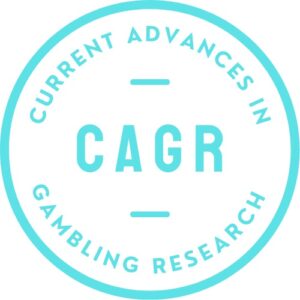Last week the SSA web team went to its first in-person conference for over 2 years. The Current Advances in Gambling Research (CAGR) conference in Cardiff, Wales featured leading names in gambling research, regulation and policy, alongside strong representation from people with lived experience. We learned so much during the event, but have narrowed it down to seven points because, you know, we’re all busy.

1: Cardiff
Cardiff was a great city for hosting the conference. Sport is a big part of the culture, identity, and economy of Cardiff (and Wales), and of course sport is a big part of conversations about why people gamble and how they can become susceptible to gambling harm.
2: Review is (over)due
Two decades is too long for gambling legislation to go without review. Several speakers reminded us that the last major piece of gambling legislation was from 2005. Since then, the gambling market has grown considerably with technology and social media changing almost out of recognition. These developments have introduced risks that couldn’t have been envisioned 17 years ago. Whilst the government’s white paper is due any time, current legislation remains dated.
3: Advertising is everywhere
Gambling advertising is so ubiquitous that we’re all constantly ‘invited to the gambling party’. There are, however, many groups of people who are particularly vulnerable to gambling harms and who face barriers to accessing help. Those same people are often continuously exposed to both generic and personalised advertising, making recovery even more difficult.
4: Suicide and gambling are linked
Just a couple of months prior to the conference, an inquest into the death of a young man reported that “feelings of shame and hopelessness” (quote from the coroner, cited by BBC) had made him feel suicidal. This case put a national spotlight on a devastating form of gambling-related harm. A 2021 study from Public Health England suggested that there might be close to 409 suicides a year related to problem gambling in England.
5: Lived experience
People with lived experience are driving change and progress. The people we spoke to talked about their work on gambling advertising and in advocating for people with lived experience to be involved in research, treatment and policymaking. They also reminded everyone at the conference about why their work is so important. We met people from GamLearn and Gambling Guardians (among others) who talked openly about their experiences and about how to make things better. Their contributions were essential to the success and focus of the conference.
6: A ‘statutory levy’
The statutory levy came up time and time again. Currently, the gambling industry directly funds research and treatment, and this issue remains highly contentious. Many people we spoke to advocated for a statutory levy which would charge the gambling industry before independently allocating those funds to treatment and research. The intention is to remove the potential for bias and conflicts of interest whilst not depriving the sector of valuable funding.
7: In-person conferences work
When was the last time (on Zoom) that you lost track of time over lunch whilst talking to someone you only met that morning? When did you last log onto Microsoft Teams only to spot someone whose research you follow checking out the sausage rolls? We can’t remember the last time we watched a full presentation without, at some point, checking emails on our second monitor, phone or (embarrassingly) both. The CAGR conference reminded us about all the things we love about in-person conferences.
The SSA was a proud sponsor of the CAGR conference. The conference management committee was Professor Simon Dymond (Swansea University), Professor Amanda Roberts (University of Lincoln) and Dr Steve Sharman (Kings College London).
by Rob Calder and Natalie Davies
The opinions expressed in this post reflect the views of the author(s) and do not necessarily represent the opinions or official positions of the SSA.
The SSA does not endorse or guarantee the accuracy of the information in external sources or links and accepts no responsibility or liability for any consequences arising from the use of such information.

